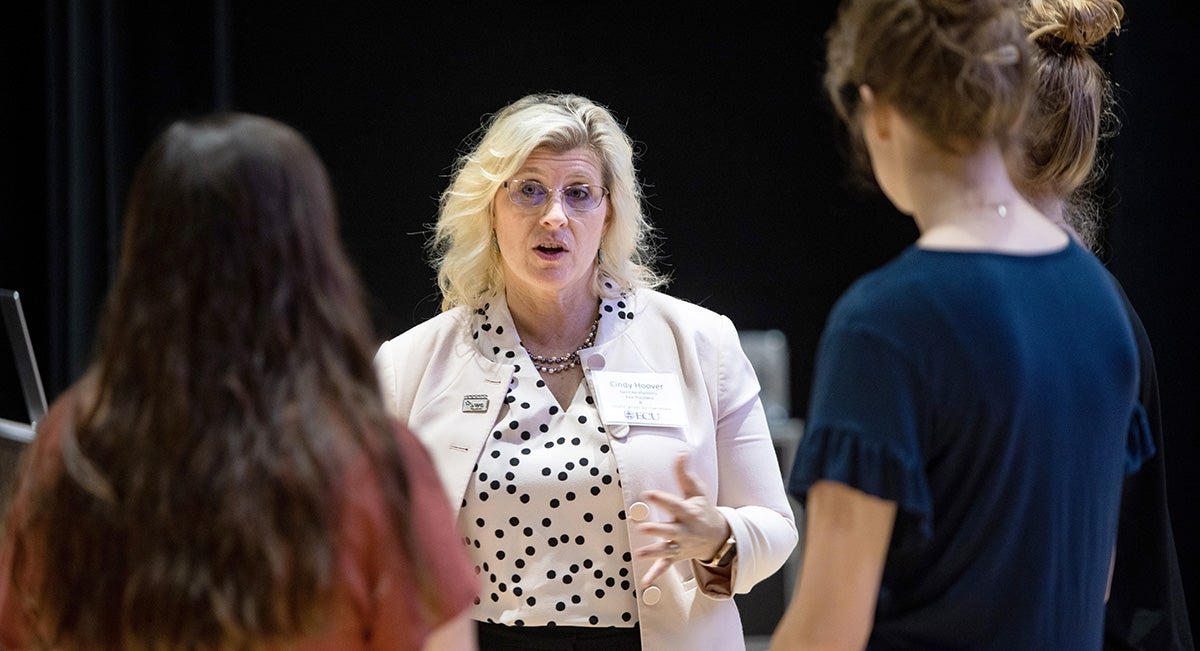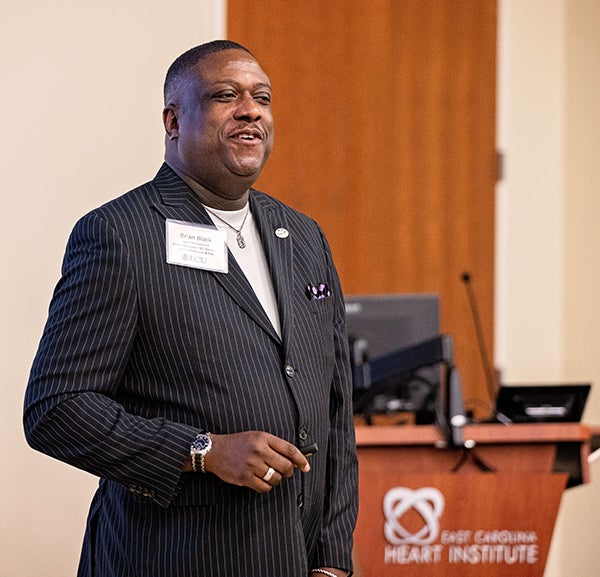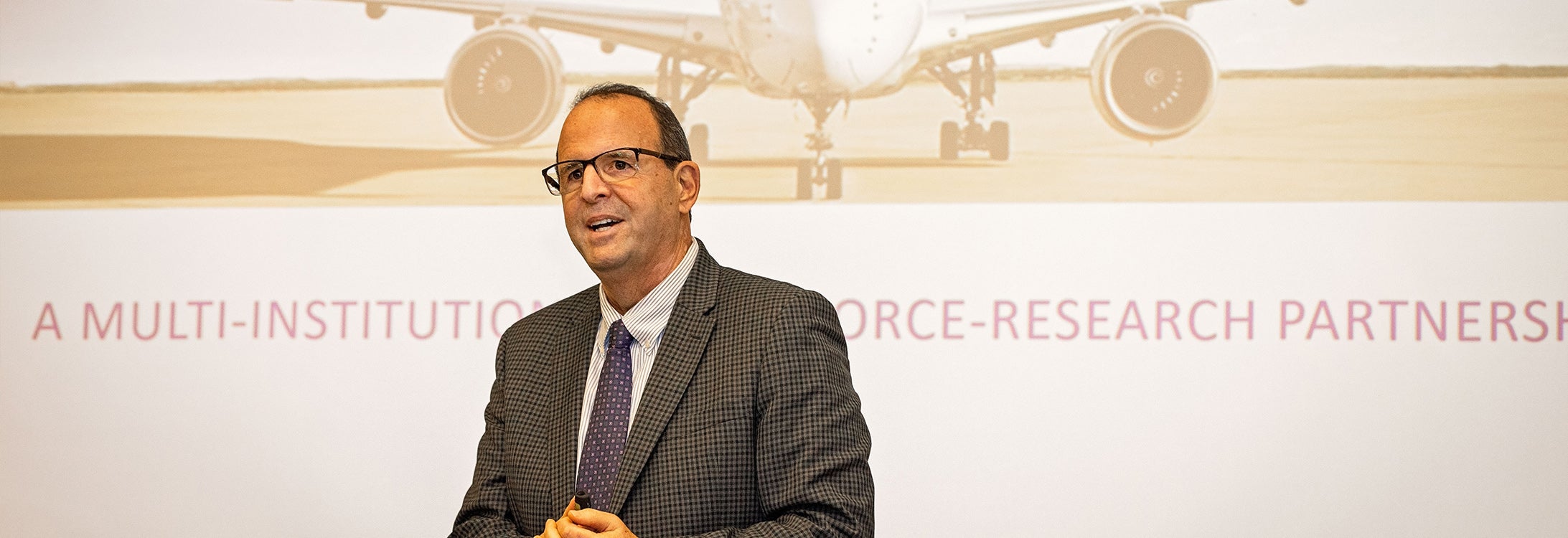SOARING TO NEW HEIGHTS
ECU brings together stakeholders to discuss aerospace industry
SWE president addresses students

Cindy Hoover, vice president and chief engineer of operations at Spirit, talks to a group of female engineers. Hoover, the national president of the Society of Women Engineers, met with ECU’s SWE chapter during a campus visit. (Photo by Rhett Butler)
During Spirt AeroSystems’ visit, members of ECU’s Society of Women Engineers (SWE) were addressed by their organization’s national president.
Cindy Hoover, vice president and chief engineer of operations at Spirit, serves as SWE’s president. Hoover has been a member of the organization for 30 years while holding multiple leadership positions within SWE.
Hoover shared the organization’s theme of “We live, we learn, we lead” for 2020, highlighting three areas she strives to balance as an organizational leader, an engineer, and a mother and wife.
She advocated for women engineers to take on leadership roles and join professional organizations, whether it be leading their local SWE chapter, signing up to be a resident advisor, or taking on an internship and learning a new skill. Hoover added that engineering has to change the way it presents itself to young girls just getting interested in the field so that it keeps their interest from grade school to college.
“Engineers are changing the world,” she said. “We have to promote that we’re inventing, designing and creating. Engineers make things that benefit society. That’s the story we need to be telling young women so we keep them in the field.”
Senior engineering major Antonia Dingeman said that having a successful role model speak to ECU SWE gave her a lot of confidence to take the next step for life after college.
“She’s worked at a lot difference places and accomplished a lot,” Dingeman said. “It gives me the feeling that all of us can accomplish a lot as well. We’re a small chapter, but having an industry professional like Cindy come and talk to us about her experience shows that if we work hard, we can achieve a lot.”
East Carolina University is determining how it can assist the state’s aerospace industry after listening to feedback from academics, industry leaders, economic directors and government representatives at a workforce development roundtable Oct. 11 at the East Carolina Heart Institute.
Stakeholders from across the state, including regional city and county managers, Elizabeth City State University, community college presidents, N.C. Rep. Perrin Jones, and representatives from the offices of U.S. Senators Richard Burr and Thom Tillis, U.S. Representatives G.K. Butterfield and Greg Murphy, and N.C. Sen. Jim Perry convened at the event, hosted by Spirit AeroSystems Inc. and ECU’s Division of Research, Economic Development and Engagement.
Representatives from North Carolina’s military from the Air Force, Coast Guard, Marine Corps, Navy, HireMilitary, and the Marine for Life Network also attended.
Vice Chancellor Jay Golden said that the group’s initial discussion focused on identifying ways to keep aerospace companies competitive in eastern North Carolina.
ECU leadership hopes to establish a public-private partnership with the goal of expanding the regional aerospace industry and creating spinoff companies through workforce development, applied learning and research. Other universities and community colleges have offered aviation training, like Elizabeth City State University’s aviation education program. ECU’s goal is to bring all of these resources together and work in conjunction with one another to assist the growing industry.
“We need to pull together resources from across eastern North Carolina’s geography, military and educational resources to work together with new and established industries that support aerospace in the region,” Golden said.
“Whether that means providing new smart manufacturing opportunities, offering micro-certifications in specialized training courses, or developing innovative ways to tackle cybersecurity and artificial intelligence, we need to establish a partnership that’s nimble enough to meet the changing dynamics of the aerospace sector.”
North Carolina is the second fastest growing aerospace cluster in the country with more than 200 related companies in the state, according to the Economic Development Partnership of North Carolina.
Brian Black, senior site leader of human resources, environmental, and health and safety at Spirit’s Kinston site, said that despite the industry’s growth, efforts must be made to close the skill gap between his industry’s needs and the region’s work force.
“We’ve started the community conversation about building an aviation talent pipeline for the future,” Black said. “We have some immediate talent acquisition needs, but we can weather that. What I’m more concerned about is being able to demonstrate to our leadership and our customers that we’re building a path that produces highly skilled workers in North Carolina.”
Nearly 70% of Spirit’s workforce demand is in manufacturing that traditionally requires a technical certificate, not a four-year bachelor’s degree.
Roundtable participants echoed Black’s workforce sentiments, but also shared additional concerns ranging from a lack of infrastructure, a scarcity of complementary jobs for spouses, and a lack of collaboration between aerospace entities in the region.
“Finding solutions to these problems is paramount to the economic vitality of eastern North Carolina,” Black said. “We began that journey today. What was encouraging was that we didn’t hear anything about turf. We didn’t talk about how great we all are; everyone was truly here to listen, provide ideas and begin to act. We’re ready to move forward.”
Golden suggested that for its next step, the group create an internal facing document of the current status of the aerospace sector in eastern North Carolina.
Any proposed university institute or center must be authorized by the UNC Board of Governors.

Brian Black, senior site leader of human resources, environmental, and health and safety at Spirit AeroSystem’s Kinston site, addresses a group of ECU faculty and staff members at the university’s Vice Chancellor’s Leadership Diversity Fellows discussion. (Photo by Cliff Hollis)
ECU faculty, leadership tackle diversity
As part of their campus visit, ECU faculty and administrators invited Spirit leadership to share their diversity experiences in engineering at the Vice Chancellor’s Leadership Diversity Fellows discussion.
The program aims to not only increase diversity in leadership roles at ECU, but also to improve the diversity of the overall campus experience and output produced by students, faculty and staff in conjunction with ECU’s Office of Equity and Diversity.
Spirit’s Cindy Hoover, vice president and chief engineer of operations and president of the national chapter of the Society of Women Engineers, and Brian Black, senior site leader of human resources, environmental and health and safety at Spirit’s Kinston site, gave their thoughts on increasing diversity without alienating others.
“You have to dispel the myth that diversity is going to promote one group while hurting another,” Black said. “A rising diversity tide lifts all boats. You cannot just have diversity goals and business goals; they must be one in the same. We’ve found that diversity drives business success.”
Hoover added that promoting diversity in industry starts by strengthening your base.
“You have to promote your industry to groups with diverse backgrounds to grow diversity in your organization,” she said. “Bringing someone in from the outside isn’t as effective as building from within. You also have to use your influence with leadership to promote that change and advocate for diverse people and ideas. Don’t just support them, but shout them out and encourage their ideas when given the opportunity.”
ECU College of Business teaching instructor Danny Ellis noted that often, even if candidates are equally qualified for a position, a candidate with a diverse background may have traveled a tougher path than their peers.
“Our journey is so different, even for two potential hires that are equal,” Ellis said. “It can be difficult for a candidate from a different race or background to reach the same level because they didn’t have the same built-in advantages or connections. Even when you reach ‘equality,’ the struggle to get there isn’t the same.”
Black said it is important for employers to agree on and clearly define talent profiles for open positions so that job candidates can be evaluated fairly.
